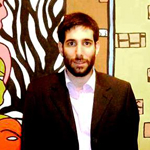

 Mr. Simeon Nikolidakis
Mr. Simeon Nikolidakis Symeon Nikolidakis is a Philologist. He studied at the University of the Peloponnese and fulfilled his postgraduate studies in Moral Philosophy. He is also completing his postgraduate studies in the Management of Business Innovation and Technology (MBIT). He has attended annual training seminars in adult education and psychology. He worked in private tutorial institutes and also, voluntarily, for two years in the library of the Faculty of Humanitarian Sciences and Cultural Studies at the University of the Peloponnese. He is a scientific collaborator in issues related to teaching at the Open Education Foundation, where he is in charge of the philological subjects’ instruction programmes. He published books on teaching in the Senior High School and teaching in Special Education. He was also in charge of publishing collective volumes related to Poetry, Teaching, Literature, and Philosophy. He taught in training seminars in Athens and Kalamata, and presented his articles at International and local scientific conferences and meetings. His articles were published in distinguished scientific journals and his texts have been incorporated in conference proceedings and book chapters. He is a member of the scientific committee of the international scientific journal Culture. He speaks fluently English, French and Italian. His scientific interests are concentrated on teaching, philosophy, school psychology, software methodology, and educational programmes
Creativity in education introduces a new area of study as it can create, combined with Biomicry, qualified leaders to meet the ongoing challenges of post-industrial societies. In this respect, education with applied Biomicry principles is attributed new characteristics and forms of operation to support future entrepreneurs in their shaping and cultivating of skills toward problem-solving and innovation practices which are primary prerequisites to personal life and organizations. In this respect, curricula should undergo specific alterations and teachers should assume their new multi-dimensional role to support establishing creative thinking skills to their students. The use of Biomimicry in creativity can be reinforced in different educational environments such as Secondary, Tertiary or Vocational Education. In each area, special modifications are sought after according to each population’s needs and expectations. At the same time, teachers should perceive their role differently by placing emphasis on their students and their aspirations. This is achieved through the implementation of novice educational methods and practices conducive to building robust creative skills that bring innovation.